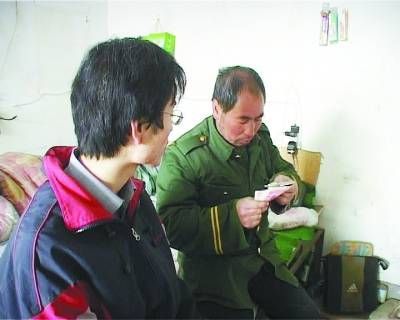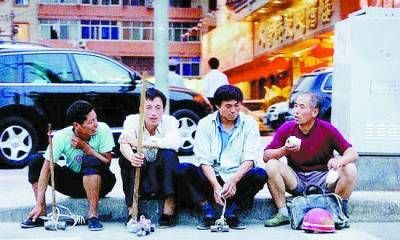(Ecns.cn)--"Studying in college is useless, isn't it?" said Han Peiyin, 58, a poor farmer in Shaanxi Province. His son Han Shengli graduated from university five years ago, but only earned 600 yuan ($94.14) a month at his first job, even less than his father's salary as a migrant worker, according to a recent documentary by Li Junhu, a director at Xi'an Television Station (XATV).
Han Peiyin used to be very proud of his son, the only college student in the whole village. "It is common knowledge that college students are promising youth," he wrote in a notebook, after learning that his son would study communication engineering at a university in Xi'an.
However, Han's family lived a humble life in a shabby house and could not afford the 7,000 yuan tuition. But in the hope that a college education might change his son's fate, he sold nearly all of their valuables, including the grain and cattle, for a mere 3,000 yuan.
"I will try my best to raise the money for the school," Han Peiyin told Han Shengli, rejecting his son's suggestion of giving up college and finding a job in a city.
With loans from his relatives and friends, Han Peiyin eventually raised enough funds and sent his son to college in Xi'an in 2002. Han also decided to stay in the city to make more money, pay off debts and prepare for his son's future tuition.
After that, Han Peiyin became a migrant worker, living off of laborious odd jobs such as flooring rooms and carrying heavy sandbags on construction sites. Most of the time, however, he was unable to find jobs at all.
Even so, Han still felt proud. "I am doing this all for my son, who is studying communication engineering in Xi'an Shiyou University," he used to tell his colleagues in a raised, cheerful voice.
"I could see that he was very proud," recalled Li Junhu, who was preparing to shoot a documentary on the children of migrant workers. "Though hardly making ends meet, he could still be optimistic, because his son's admission to college gave him dignity."
Hard up for money, father and son did not meet often even though they lived in the same city. A 2-yuan single-trip bus ticket was already a heavy burden for them.
"Try not to buy many books, too expensive," Han Peiyin sometimes told Han Shengli over the phone. "Be knowledgeable and professional in the future, and never become a farmer or do arduous labor work like me," he added.
"Efforts today will pay off tomorrow," he read from his notebook, where he recorded his feelings. "You, your mother and I must take a tour to Beijing around 2013, when I am about 60 years old. We will be rich then."
But that dream turned into a nightmare in 2006, when Han Shengli graduated from school and found it hard to find a decent job.
"Dear, what shall we do now? People in our village will laugh at you for squandering your college years," his mother said when he returned home.
Han Shengli found a job in Qinghai Province installing optical cables with a monthly salary of 600 yuan on probation.
"I had thought that my son would work in an office equipped with air conditioning," said Han Peiyin, who concluded that he was making more money than his son.
Han Peiyin started to regret letting his son study communication engineering, and even sending him to college in the first place.
"If Han Peiyin had bought his son a pedicab instead of accepting the offer of admission, the boy could have made a fortune by now," murmured Han's neighbors.
Feeling ashamed, Han Shengli resigned three years later and found a new job in Xi'an, with a salary of 1,500 yuan – still a humble figure compared to that of his classmates. Even Shengli's sister, a junior high graduate who works in Shenzhen, makes up to 4,000 yuan a month.
"Are you going to send your grandchildren to college in the future?" someone asked Han Peiyin.
"In my opinion, studying in college is useless," sighed Han.



















